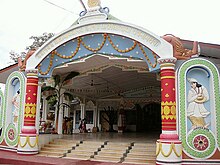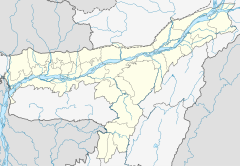|
Dhekiakhowa Bornamghar
Dhekiakhowa Bornaamghar(Assamese: ঢেকীয়াখোৱা বৰনামঘৰ) is a naamghar in Jorhat district, Assam, India, that was established by saint-reformer Madhavdeva.[2][3] In 1528 (1450 Saka), Madhavdeva kindled an earthen lamp there, which according to the naamghar's managing committee has been burning continuously since then, being refueled with mustard oil by the priests.[4] It is located at Dhekiakhowa village of Jorhat district, 15 km towards the east of Jorhat city 3.5 km away from National Highway 37.[1] It is called a Bornaamghar because of its historical association and large campus. The naamghar is situated in a complex of facilities spread over 13 bighas of land. The naamghar and other facilities are maintained by a managing committee with donations from devotees. Besides the maintenance of the complex, the managing committee sponsors various social and cultural programs. There is an anecdote after the name of Dhekiakhowa Naamghar. Guru Madhavdeva after taking up the duty of reforming people and spreading the Ekasarana Naam Dharma came to stay in this small village. He took shelter for the night at the hut of an old woman, who served him rice with Dhekia Saak (Fiddlehead Fern), a very common wild vegetable. The old woman was very embarrassed to have served the Saint guru like this but he was immensely pleased by the dinner. So he started a naamghar there and given the responsibility of kindling the earthen lamp to the old woman. The naamghar was later known as Dhekiakhowa Naamghar. A lot of visitors and devotees gather in the naamghar everyday, especially during the sacred month of Bhado (August–September), for this month being the Death Anniversaries of both the gurus Srimanta Sankardeva and Madhavdeva[5][6] LegendThere are many stories associated with this Bornamghar. It is said that the main pillar of the namghar is made of a Sal tree. One night one of the bhakats (monk) of the namghar saw in his dream that the river near the Bornamghar (known as Dhekiakhowa jaan) is flowing in opposite direction and is carrying a Sal tree mean to be for the construction of the Bornamghar. Next day when people saw that dream to be true, they made the main pillars of the Bornamghar from the tree.[7] FestivalsSeveral festivals and sessions of special worship, besides the daily worships, are celebrated every year in certain months. These festivities are attended by lakhs of devotees:
Gallery
References
External linksWikimedia Commons has media related to Dhekiakhowa Bornamghor.
|
||||||||||||||||||||||||||||||||
Portal di Ensiklopedia Dunia



